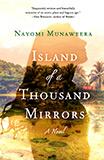Book Club Discussion Questions
In a book club? Subscribe to our Book Club Newsletter!
For supplemental discussion material see our Beyond the Book article, The Sri Lankan Civil War and our BookBrowse Review of Island of a Thousand Mirrors.
Please be aware that this discussion guide will contain spoilers!
About the Book
Before violence tore apart the tapestry of Sri Lanka and turned its pristine beaches red, there were
two families. Yasodhara tells the story of her own Sinhala family, rich in love, with everything they
could ask for. As a child in idyllic Colombo, Yasodhara's and her siblings' lives are shaped by social
hierarchies, their parents' ambitions, teenage love and, subtly, the differences between Tamil and
Sinhala people; but the peace is shattered by the tragedies of war. Yasodhara's family escapes to
Los Angeles. But Yasodhara's life has already become intertwined with a young Tamil girl's...
Saraswathie is living in the active war zone of Sri Lanka, and hopes to become a teacher. But her
dreams for the future are abruptly stamped out when she is arrested by a group of Sinhala soldiers
and pulled into the very heart of the conflict she has tried so hard to avoid – a conflict that,
eventually, will connect her and Yasodhara in unexpected ways.
In the tradition of
Anil's Ghost and
The God of Small Things, Nayomi Munaweera's
Island of a Thousand Mirrors is an emotionally resonant saga of cultural heritage, heartbreaking conflict and
deep family bonds. Narrated in two unforgettably authentic voices and spanning the entirety of the
decades-long civil war, it offers and unparalleled portrait of a beautiful land during its most difficult
moment by a spellbinding new literary talent who promises tremendous things to come.
Discussion Questions
- In this book, Munaweera takes o
n the point of views of both a Sinhala woman and a Tamil
woman. Why do you think she made this decision? What does it mean to try and express both
points of view when the subject is a civil war? Do you think she was more successful in painting
one or the o
ther of these women? Which one and why do you think so?
- Did your reading of the Prologue change after you finished reading the book? How?
- This is a book partly about the process of immigration. Do you think Munaweera successfully
captured the pleasures and pains of immigration? Did she successfully express the divided
nature of the immigrant? Did she do so in ways that reminded you of other authors or was the
experience of reading this book quite different?
- This novel has been compared to
The God of Small
Things,
Anil's Ghost, and
The Kite Runner. If
you've read these books, do you think these are fair comparisons? Why or why not? Are there
other authors/books Munaweera's style reminds you of?
- Visaka and Ravan's love is thwarted but their children go on t
o fall in love. What dose
Munaweera seem to be saying about destiny, the acts/sins of parents, the nature of love?
- The big white house on the seaside in Colombo figures prominently in this book. It is where
Visaka grows up, where Yasodhara is brought after she is born and where the Upstairs
-
Downstairs wars take place. What does this house seem to represent in the book?
- The riots in 1983 are described as a pivot point in the history of Sri Lanka and in the plot of the
book. Were these scenes similar to painful moments in other parts of the world?
- Saraswathie grows up with aspirations of becoming a teacher. Do you think what happens to
her subsequently is plausible? Do you think Munaweera properly describes the process by
which a normal girl might become a
suicide bomber?
- The scene of Saraswathie's rape is extremely traumatic and Munaweera has admitted that it
was quite difficult for her to write. Do you think the scene was necessary in the book or should
literature stay away from depicting the most painful
events in a character's life? Why do you
think Munaweera chose to include this scene?
- Would you describe this book as a feminist work? If so, why?
- Munaweera has admitted that this is a book obsessed with food. Did you find this to be true?
Did the book
make you interested in finding out more about Sri Lankan cuisine?
- What does the ending message of the book seem to be?
Unless otherwise stated, this discussion guide is reprinted with the permission of St. Martin's Griffin.
Any page references refer to a USA edition of the book, usually the trade paperback version, and may vary in other editions.
